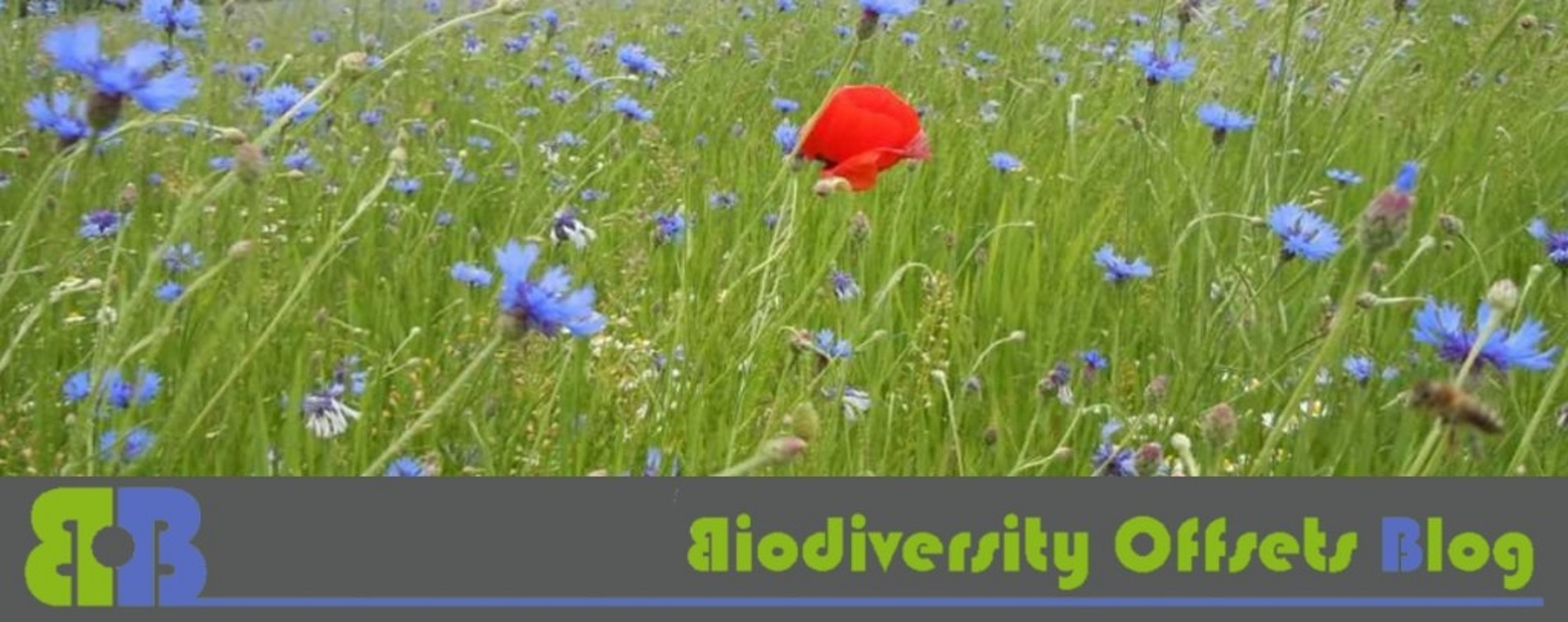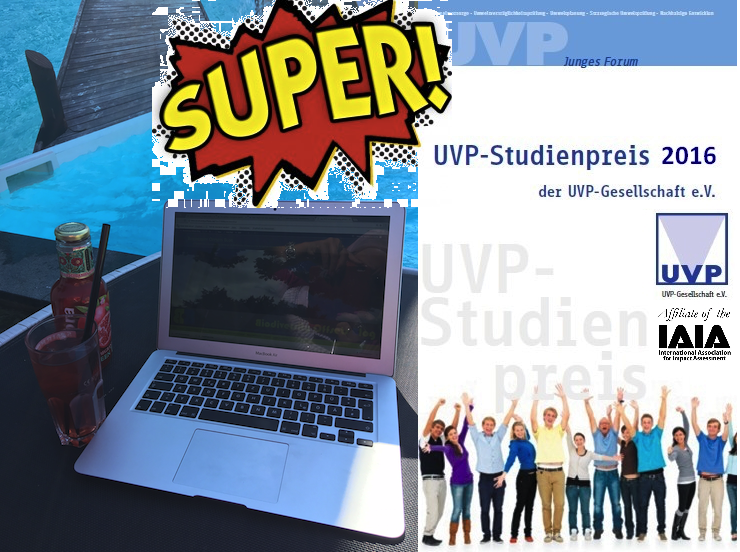Welcome to the Biodiversity Offsets Blog! This site aims to provide an interdisciplinary platform for the information and exchange on Biodiversity Offsets, the Mitigation Hierarchy and the wider context.
The About-section in the menu above gives you a brief introduction to what biodiversity offsets are and summarizes the objectives of this blog. You may also want to get to know about me and my PhD (which is the basis for this blog).
The Biodiversity Offsets Blog has only recently started (it went online in August 2014) and thus will continuously be updated with any upcoming information. The whole bunch of information that has risen in the past few years will also be incorporated bit by bit.
As the focus of this platform is to bring people and their expertise together, please get in contact if you have anything to share. It is highly welcomed if you would like to write posts or reviews or share photographs (Please request author rights). You can also comment to any post or start a discussion on the open discussion platform.
PLEASE NOTE THAT THIS IS NOT A PLATFORM FOR THE PROMOTION OF BIODIVERSITY OFFSETS: STRONG OPINIONS FROM BOTH PROPONENTS AND OPPONENTS (AND ALL THAT LIES IN BETWEEN) ARE VERY MUCH WELCOME!
In this sense you are also kindly requested to answer the current polls (see in the sidebar on the right or below if you are using mobile devices). Thank you.
Please find below a list of all posts or choose from the menu above for a specific focus.
FOR NETWORKERS
Have a look at the Experts and Exchange section if you want to get to know experts in the field of biodiversity offsets from all over the world with their respective focus of expertise or explore past and present PhD topics.
FOR INFORMATION SEEKERS
Have a look at the sources section to explore relevant literature as well as a growing list of links to websites.
FOR PRACTITIONERS
It is greatly appreciated if you’d contribute to and exchange on biodiversity offsets on the ground. See information on policies and governance and also worldwide examples of biodiversity offsets.
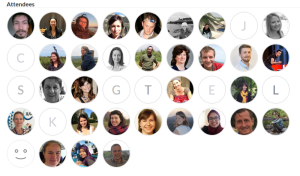 If you’ve been around social media in recent weeks and interested in nature conservation, you probably have come across the Conservation Optimism Summit (held in London, 20–22 April 2017). There has been a lot of excitement and positivism. This, however hasn’t prevented the organizers from shedding some light also on the more uncomfortable side of our relation to nature: when we’re exploiting inature to fulfill our hunger for resources and goods. Entitled “The future of corporate biodiversity accounting and disclosure” the session chaired by Prue Addison from the Interdisciplinary Centre for Conservation Science at the University of Oxford set the focus on business and biodiversity. More information on the outline as well as the attendees can be found below. To engage in the wieder discussion check also on the website of the Conservation Optimism Summit or follow the hashtag #ConservationOptimism. Continue reading →
If you’ve been around social media in recent weeks and interested in nature conservation, you probably have come across the Conservation Optimism Summit (held in London, 20–22 April 2017). There has been a lot of excitement and positivism. This, however hasn’t prevented the organizers from shedding some light also on the more uncomfortable side of our relation to nature: when we’re exploiting inature to fulfill our hunger for resources and goods. Entitled “The future of corporate biodiversity accounting and disclosure” the session chaired by Prue Addison from the Interdisciplinary Centre for Conservation Science at the University of Oxford set the focus on business and biodiversity. More information on the outline as well as the attendees can be found below. To engage in the wieder discussion check also on the website of the Conservation Optimism Summit or follow the hashtag #ConservationOptimism. Continue reading →
 The EKLIPSE project, funded by the EU in H2020, is developing a European Mechanism to answer requests from policy makers and other societal actors on biodiversity related issues.
The EKLIPSE project, funded by the EU in H2020, is developing a European Mechanism to answer requests from policy makers and other societal actors on biodiversity related issues.
A request on supporting businesses to improve the outcomes of their operations for biodiversity was proposed by the Scottish Environment Protection Agency (SEPA). In response to this EKLIPSE is launching an open Call for Knowledge inviting scientists, policy makers, practitioners and other societal actors to share their knowledge and available resources on this specific selected request. Continue reading →
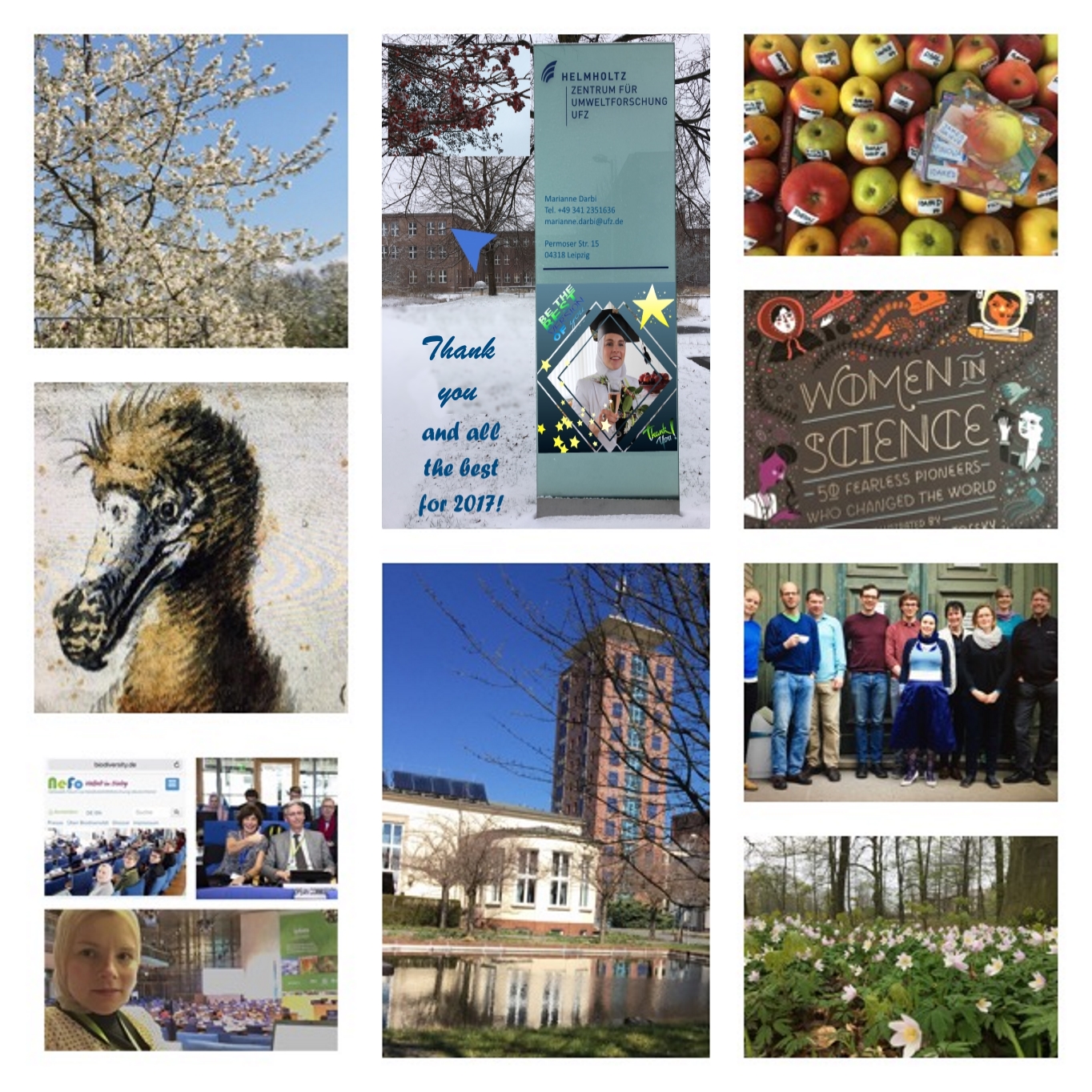 The past year has been an exciting one for me: tying together all the loose ends, finalizing my PhD thesis and looking for new endeavors and opportunities…
The past year has been an exciting one for me: tying together all the loose ends, finalizing my PhD thesis and looking for new endeavors and opportunities…
Most importantly, after more than ten years at the Leibniz Institute of Ecological Urban and Regional Development (IOER) in Dresden, I have left my professional or scientific cradle to head for an exciting Postdoc position at the Helmholtz Centre for Environmental Research (UFZ) in Leipzig. I have joined the Science Policy Expert Group in the department of Conservation Biology there in January. This was definitely one of the best or meaningful decisions I have made in the past few years (if ever you come to ask yourself whether you should stay in a situation that comforts you, but doesn’t challenge you anymore or go for something new: go and get outside your comfort zone!). Continue reading →
 This is a last minute reminder to register for another interesting BBOP webinar, taking place today, October 12.
This is a last minute reminder to register for another interesting BBOP webinar, taking place today, October 12.
Ophélie Darses, Deputy Bureau Chief of Global Public Goods from the French Ministry of Environment, Energy and Sea, and Fabien Quétier from the French environmental consultancy Biotope will present and discuss the new provisions introduced by the new French biodiversity law including its implications on the rights and duties of “offset operators”, financial guarantees for offsets, and a national public georeferenced database on offsets.
As usual the webinar is part of the BBOP community of practice (all previous webinars are archived there if you want to listen to them later).
Continue reading →
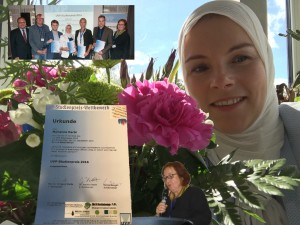 I had blogged about it earlier how happy I am to receive the EIA Study Award of the German Society for Environmental Impact Assessment.
I had blogged about it earlier how happy I am to receive the EIA Study Award of the German Society for Environmental Impact Assessment.
The big day had finally come Thursday, 30 November and I was enjoying both an interesting EIA congress with lots of inspiring talks from practitioners, policymakers, scientists and administration. But of course, my personal highlight was the official award ceremony. Thanks to the jury for choosing my work for this prize and especially thanks to Prof. Sabine Baumgart for a fantastic laudation (sometimes I couldn’t believe she was speaking about me and my work ;o)). And again, heartful thanks to all of you for your support and contribution to this work and the warm words and congratulations that I have received so far.
After uploading the German official press release, I now want to share the English version of the press release with you. For whom this may be a bit too formal, find below also some photographs :o)
Official press release on the EIA study award
Marianne Darbi, research assistant at the Leibniz Institute of Ecological Urban and Regional Development (IOER), has received the EIA Study Award 2016 for her dissertation on the mitigation of environmental impacts. With a prize of up to € 5,000, the award goes to outstanding research in the field of environmental impact assessment (EIA). It was awarded by the German Society for Environmental Impact Assessment (UVP-Gesellschaft) end of September. Marianne Darbi had convinced the independent jury with a global typology of measures to compensate for biodiversity loss. Continue reading →
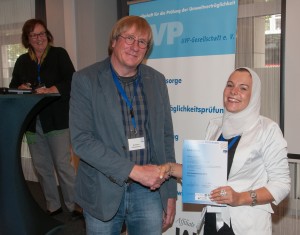
Burkhard Fahnenbruch vom Vorstand der UVP-Gesellschaft gratuliert Preisträgerin Marianne Darbi (re.), im Hintergrund: Laudatorin und Jury-Mitglied Prof. Dr. Sabine Baumgart von der TU Dortmund. (Quelle: UVP-Gesellschaft e. V.)
[This is the official press release (in German) on the recent EIA study award that I have received for my PhD on biodiversity offsets.]
Für ihre Dissertation über die Regulierung von Eingriffen in die Umwelt hat Marianne Darbi, wissenschaftliche Mitarbeiterin im Leibniz-Institut für ökologische Raumentwicklung (IÖR), den UVP-Studienpreis 2016 erhalten. Der mit insgesamt bis zu 5.000 Euro dotierte Preis geht an herausragende Forschungsarbeiten rund um das Thema Umweltverträglichkeitsprüfung (UVP). Er wurde Ende September von der Gesellschaft für die Prüfung der Umweltverträglichkeit (UVP-Gesellschaft) verliehen. Marianne Darbi hatte die unabhängige Jury mit einer weltweiten Typisierung von Ausgleichsmaßnahmen zum Erhalt der biologischen Vielfalt überzeugt. Continue reading →
 As I had promised earlier, I am sharing with you some impressions and presentations from our biodiversity offsets session at the recent EcoSummit in Montpellier. After the general session description and line-up of speakers, find below the abstract and presentation for each of the speakers (including a few photographs). Continue reading →
As I had promised earlier, I am sharing with you some impressions and presentations from our biodiversity offsets session at the recent EcoSummit in Montpellier. After the general session description and line-up of speakers, find below the abstract and presentation for each of the speakers (including a few photographs). Continue reading →
What’s it about in short: CIRIA, the UK’s construction industry research and information association joins forces with Balfour Beatty to target Biodiversity Net Gain following ‘best practice principles’
When was it released: September, 2016
By whom: CIRIA UK, Julia Baker
More info: http://www.ciria.org/News/blog/Biodiversity_Net_Gain_is_the_next_big_thing.aspx Continue reading →
In this webinar, brought to you by IEMA, CIRIA and CIEEM, Julia Baker will outline and review the best practice principles for UK industry to achieve biodiversity net gain outcomes from development. It will focus on recent principles, drafted and developed through a collaborative and cross-profession based partnership. It will also provide examples of biodiversity net-gain approaches and insights into developing guidance.
When: September 22, 2016 1:30 PM — 2:45 PM CEST
How: you can register here: https://attendee.gotowebinar.com/register/3041335300843281412
